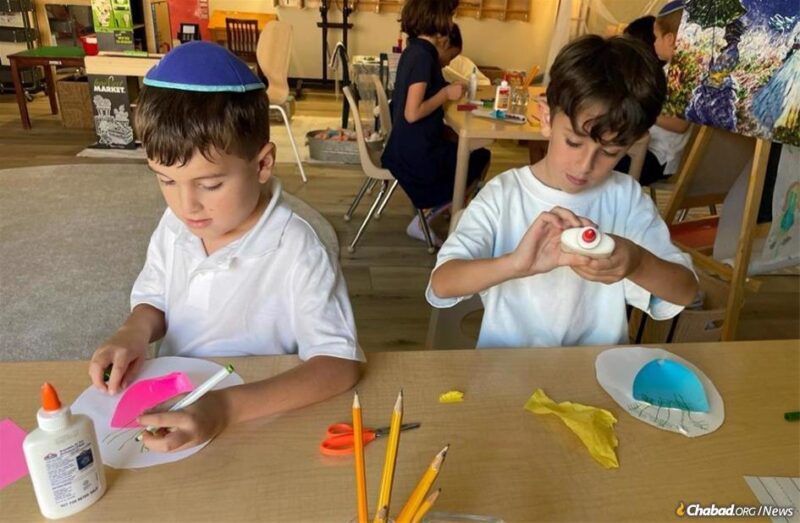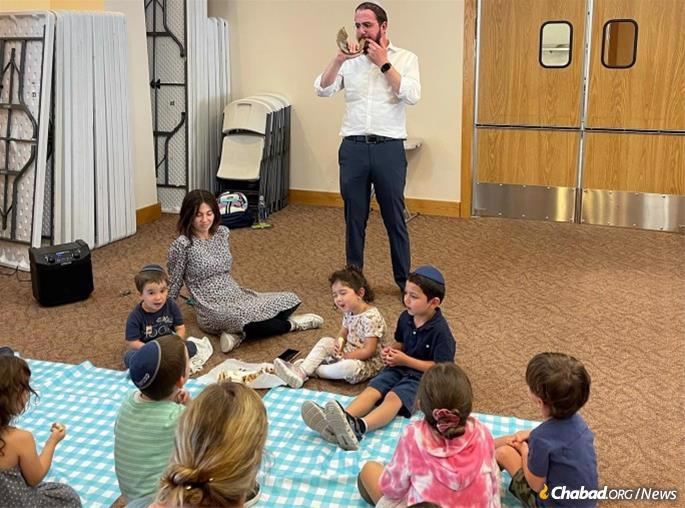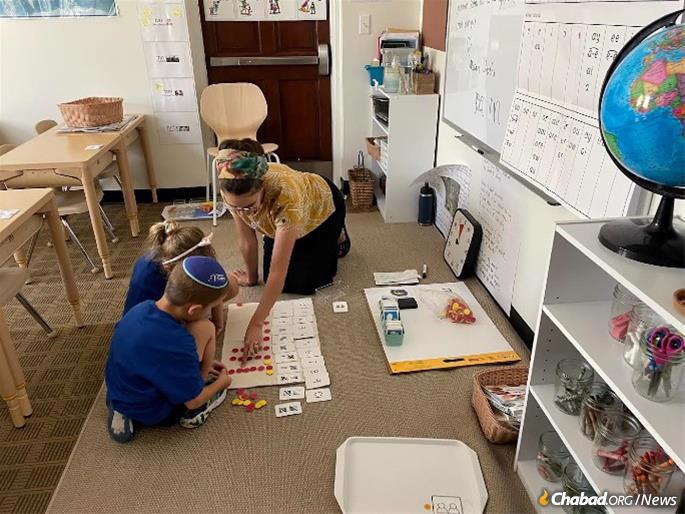
Fastest-Growing Jewish Day School Network Continues to Branch Out
by Faygie Levy Holt – chabad.org
As a career educator, Shoshi Shachar of Chandler, Ariz., is always on the lookout for ideas on what makes an elementary school successful. She even keeps a growing spreadsheet of the essential elements of any excellent educational institution. When it came time to look at schools for her own young children, there were quite a few items on her wish list. Yet none of those she looked at were the right fit, she said.
Or, at least, not until now.
This month, Tamim Academy of Chandler opened its doors to students with a kindergarten and a combined first- and second-grade class under the auspices of Shternie and Rabbi Mendy Deitsch, directors of Chabad of the East Valley.
“When I heard about and researched Tamim as an educator, I saw that it uses the approaches to teaching I was looking for,” Shachar told Chabad.org. “And when I looked at the schools in the network as a parent, I saw that it’s really well done.”
Shachar will not only have two students in the school, she’ll also be a teacher there as well.
“People in Chandler have been asking for a Jewish day school for years,” said Shternie Deitsch, who credits Shachar with pushing for the opening of the Tamim school. “We started a kindergarten five years ago, and we always had an interest in expanding into a day school but didn’t have the expertise to handle it.”
The Tamim Academy network of Jewish elementary schools was created to provide that expertise. As part of the fastest-growing Jewish educational program in North America—the Tamim Academy of Chandler school will have access to a detailed educational curriculum and ongoing teacher training, administrative support, business-model coaching and more.
A new Tamim Academy will also open this fall in Portland, Ore., bringing the total number of Tamim schools to 12, as they join already established schools in Manhattan and Queens, N.Y.; Miami and Boca Raton, Fla.; Salt Lake City; Burlington, Vt.; Austin, Texas; Cambridge, Mass.; Greenwich, Conn.; and Toronto. Additional schools are expected to open in the next few years.

Facing the Challenges of Day Schools
Like many Jewish parents around North America, Shachar’s children thrived at the Chabad preschool program. “The Chandler Jewish Preschool is a magic little place,” she said, “and I was looking for the same atmosphere in an elementary school.” Chabad has long been a leader in Jewish preschool education, providing warmth and care that parents say is unique while ensuring that kids are learning about their Jewish heritage and the educational basics that will help them prepare for school.
The preschools run by Chabad emissaries have become well-known; some are among the top-ranked programs in their cities, while others have been steadily growing their enrollment. Some parents have loved the preschools so much that they have requested the school continue on to kindergarten and beyond.
Still, the costs of operating a Jewish day school are much more prohibitive than a preschool, especially in small communities where there would be a limited pool of students. Even in areas teeming with young Jewish families, there is no guarantee of success, especially since the number of children enrolled in Jewish day schools has been on the decline in recent years.
According to the Avi Chai Foundation, the number of Jewish children enrolled in a non-Orthodox Jewish day school had dipped significantly from 37,000 in 1998 to 30,756 in 2018-19 representing a 16.6% decline in enrollment over 20 years.
It was within this context that the Tamim Academy model was born.
The goal of a Jewish education is primarily about empowering children with a real and personal relationship with G‑d—Who created them, loves them and knows each one of them has something unique to offer the world and make it a better place.
Numerous studies have confirmed that children who receive a Jewish education are much more likely to be active in Judaism as adults, something communal advocates have been saying for years. Yet while the American Jewish Population Project estimates that there are approximately 1.6 million Jewish children in the United States, only 292,000 are enrolled in Jewish day schools. More than 80% of American Jewish children—almost 1.3 million—are outside the Jewish day-school system.

New Opportunities in Portland
According to Rabbi Shmulik Greenberg, a board member of the Tamim Academy in Portland, being part of the educational network “gives us access to the best parts of education on a silver platter, as Tamim includes the best research, top-quality curriculum and teacher training, allowing us to focus on the child and their educational and emotional well-being.”
Rabbi Tzemach Gelman, who will serve as the director of the new Tamim Academy in Chandler, said the focus on the whole child includes combining a child’s knowledge and the choices they make.
“What we learn is not separate from what we do and how we behave,” he said.
He praised the centralized curriculum that drives the Tamim educational experience. As an experienced Judaics teacher, Gelman said that creating curriculums from scratch takes a lot of work, especially when you are reinventing the wheel for different classes and age groups. With Tamim, though, “we will have an existing curriculum that is so well thought out it will allow me to focus on what’s needed in the classrooms and what the teachers need.”
Also, Gelman said, “I think the amount of support there is from Tamim headquarters is reassuring. If you have a question, someone has the answer. Running a school isn’t an easy task, and it helps to know that there are people out there who support you.
“It’s also exciting and wonderful,” he added.
Coincidently, Gelman’s sister, Chaya Orenstein, will be teaching at the new Tamim Academy in Portland and had told Gelman about the program even before he was hired at the school.
As for Orenstein, one of the things that most appeals to her about the school network is their motto that says “every single person in the Tamim infrastructure—principals, teachers, students—are always learning and growing. That is very exciting.”

Growing Enrollment in Salt Lake City
In Salt Lake City, the Tamim Academy will start the upcoming school year with nearly 30 students. It has become a draw for young Jewish families who live in the area and even those who are considering moving into the fastest-growing state in the country.
“The school has completely raised our profile as to who we are as a Jewish community, and that we are a Jewish community that can provide a solid infrastructure of education for Jewish children,” said Rabbi Avremi Zippel, program director of Chabad Lubavitch of Utah, who also directs the Salt Lake City Tamim Academy. “The greatest hindrance in growing our community has been the lack of Jewish education, and Tamim allows more families to settle here.”
The elementary school has also led to more families joining Chabad’s preschool program there.

The Lifelong Gift of Jewish Education
The importance of Jewish education has long been a primary focus of Chabad-Lubavitch. When the Sixth Rebbe—Rabbi Yosef Yitzchak Schneersohn, of righteous memory—came to the United States in 1940, one of the first things he did was open a school, Soon thereafter, he created Merkos L’Inyonei Chinuch, the educational arm of the Chabad-Lubavitch movement, placing his son-in-law, the future Rebbe—Rabbi Menachem M. Schneerson, of righteous memory—at the helm.
Merkos was the first Jewish educational organization of its kind, establishing dozens of Jewish day schools in cities around the country, and creating programming, curricula, textbooks and children’s publications in multiple languages. It was also instrumental in opening dozens of local Jewish day schools that were not formally affiliated with Chabad, in line with its underlying goal to “promote Jewish-religious education in all sections of Jewry,” as a 1948 brochure makes clear, “without any distinction whatsoever, so as to bring up a new generation of Jewish children … .”
The Rebbe further expanded on this in 1976, when he elevated the urgency of educating every Jewish child to a directive in what ultimately became one of the 10 Mitzvah Campaigns. For his Education Campaign, the Rebbe emphasized the importance of reaching every Jewish child, empowering children to teach their fellow children, and that the concept of education does not end with children.

He also encouraged the opening of new schools and educational facilities for Jewish children from all backgrounds. At the time, the Rebbe reiterated that these new schools, as well as existing ones, provide scholarships when necessary so that no Jewish child would find him or herself without access to quality Jewish education.
With the creation of the Tamim Academy network, Jewish children in cities and towns across North America are increasingly having the opportunity to gain that education.
Tamim of Portland parent Annie Isaac praised the strong general-studies curriculum that her children will be receiving but said she is also looking forward to the Hebrew-language program that is a core part of the Tamim educational model.
“I am thrilled the school will be implementing Jewish immersion for half the day,” she said, calling a strong Jewish foundation “a lifelong gift” to the children.











